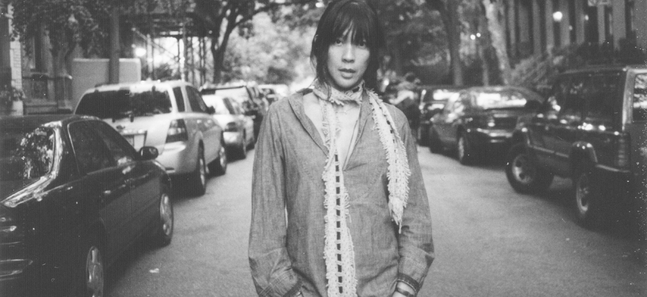We Are The Works In Progress
Blonde Redhead’s Kazu Makino talks about her new Japan benefit album

Kazu Makino (photo by Drew Brown)
Posted: Tue Jan 31 2012
Musicians responded quickly to the March 11 quake and tsunami. Within a week of the disaster, we were beginning to see charity albums pop up online – and they kept on coming. It was a heady time: everyone from Linkin Park to Lullatone seemed to be getting in on the action, while websites like Bandcamp meant that even spur-of-the-moment amateur fundraisers could quickly start soliciting donations. But noble intentions don’t always translate into good art, and while we certainly wouldn’t begrudge the efforts of any of the people who took part, we’d also rather not have to sit through barrel-scraping efforts like the Songs for Japan album. Ever.
We Are The Works In Progress has come rather late to the party – almost 11 months, to be precise – but it immediately stands out. Compiled by Kazu Makino, the New York-based vocalist for avant rock trio Blonde Redhead, this Japan benefit album features unreleased (and, in some cases, unfinished) tracks by an impressive selection of artists, ranging from electronica producer Four Tet to 76-year-old minimalist composer Terry Riley, via Pitchfork faves Deerhunter and John Maus. It’s also going to be available on vinyl, which is just cool.
‘We didn’t want it to compile already existing music: we wanted something exclusive and original,’ says Makino when we contact her by email. She explains that she knew about half of the artists featured on the album (hello, fellow New Yorkers Interpol), and essentially cold-called the others to request songs. ‘I initially asked them for their favourite demos or a different version of an already existing song that they were attached to,’ she continues. ‘I welcomed unfinished material because of the energy it carries.’
One of the more poignant moments on the album comes in the shape of ‘In Here The World Begins’ by Broadcast, the retro-futurist band whose singer Trish Keenan died from pneumonia in January last year, at the age of 42. ‘I remember the shock and sadness I felt when she passed away, almost exactly two months before the earthquake,’ says Makino. ‘I know it is not correct to talk about these two tragedies in the same way, but I felt a similar [sense of] devastation, like the ground was breaking down underneath me.’

She says that the compilation is intended to ‘support Japanese people to take matters in their own hands, and choose the right path to recovery’. Proceeds will be split between the Japan Society Earthquake Fund and Architecture for Humanity (Makino admits that, because of tax regulations, her choice was restricted to charities with branches in the US).
If some of the artists who released benefit albums last year weren’t exactly known for their political leanings, Blonde Redhead have never shied from hot-button issues. The group’s Facebook page is crowded with links to articles about environmental issues and civil rights (and a ton of YouTube music videos – they’re still a band, after all), and Makino is unsparing in her criticism of the official response to last year’s disaster.
‘I am stunned by the stupidity and arrogance of the Japanese government and politicians,’ she says, when asked how she feels about the country’s prospects for the future. ‘No matter what happens, I think the Japanese people must insist on the right path, even it means taking down the government – which I’m afraid is not really in their nature.’
But revolution or no, her cynicism about officialdom is matched by her ‘faith in the spirituality and purity of the Japanese people’ and their ability to overcome problems, particularly through science and technology. ‘My hope is that Japan would emerge as a leading figure in realizing truly sustainable living,’ she says. ‘But I suppose no one can predict the outcome, as this is an unprecedented catastrophe.’
Though Blonde Redhead haven’t been on tour to Japan since January last year, Makino returned here in November to see how things were looking on the ground. ‘I noticed that Tokyo was darker, and people were diligent about carrying umbrella in rain – but not so careful about eating sashimi and sushi and checking where the produce was coming from,’ she recalls. But while some found it eery to see Tokyo’s neon lights extinguished, she found a strange kind of poetry in the experience: ‘I like the darker Japan. I think it looks romantic. Kyoto and Nara were always darker than, say, Tokyo and Osaka, and it’s beautiful.’
We Are The Works In Progress is released in vinyl and digital formats on February 7. See wearetheworksinprogress.tumblr.com for details
Tweets
- About Us |
- Work for Time Out |
- Send us info |
- Advertising |
- Mobile edition |
- Terms & Conditions |
- Privacy policy |
- Contact Us
Copyright © 2014 Time Out Tokyo














Add your comment